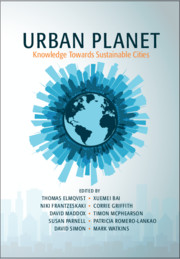Record-breaking weather patterns are becoming a defining feature of our world. Although to some people in the United States, this simply looks like odd weather, it is irrefutable that climate change is here. Unless we start taking care of Earth, it will soon fall to destruction. Every year, low-lying countries and communities face rising sea levels that are threatening their existence. For someone born and raised in the United States with roots in Bangladesh (Umamah), knowing that this country will be underwater by the end of the centuryFootnote 1 is sickening. Climate change affects us all, whether it be coastal cities in the United States or island nations all together, everyone will face the consequences of this global issue.
Despite the overwhelming evidence, many in the United States still doubt that climate change is real (or at least a threat). In New York City, though, there is little doubt. We have seen the effects of climate change firsthand in 2012’s Superstorm Sandy. In author Kate’s neighborhood in Queens, NY, many homes were damaged by fallen trees, and there was flooding all over the city. The damage was so severe that many of her good friends were forced to relocate permanently. The level of destruction was massive; entire neighbourhoods, such as Far Rockaway and parts of Lower Manhattan and Staten Island, were wiped out. It has been proven that storms have intensified due to climate change, producing storms such as such as Sandy, and future storms will only increase in severityFootnote 2. In the aftermath of Superstorm Sandy, we realized how uninformed we were about climate change. We also learned that youth will be disproportionately affected by climate change because we are the ones inheriting a sick planet. Knowing this and realizing that apathy will not solve this problem, we decided to take action. Through our involvement with Global Kids, a nonprofit educational organization for youth leadership and global education, we became engaged citizens.
Although it may seem daunting, everyone, especially youth, can contribute to solving the climate change problem by encouraging, nudging, and even annoying government officials into taking action. Disinvestment campaigns promoted by hundreds of college students, which seek to drive academic institutions to disinvest from fossil fuel holdings, is an example of collective action’s effectiveness.
Here in New York City, we have taken a stand locally with our climate change education campaign. It began in 2013 when, as high school students, we decided the best way for us to fight climate change was through education. Climate education has the power to enlighten people on the science of climate change and to prepare people to find solutions. We reached out to New York City Council Member Costa Constantinides to express our concerns for the lack of climate change education in all New York City public schools. Constantinides represents parts of Queens that were particularly affected by hurricane Sandy; therefore, he has a particular interest in climate change. In addition to his interest in safeguarding his district, Constantinides also had a history of advocating for youth and supporting similar resolutions. By working with him, we were able to make connections with other city officials to support the resolution. Thanks in part to our advocacy efforts, in August 2014, NYC Council Members Constantinides and Donovan Richards introduced Resolution 0375 calling for climate change education in all New York State schools, grades K–12.
Since the introduction of Resolution 0375, we have contacted more New York City Council Members, often on a daily basis, to gain their support. Prior to this campaign, many of us had no experience in lobbying. While this process requires dedication and commitment, it can be a surprisingly simple job. Every week we were either calling offices, writing letters, emailing, and/or visiting offices to lobby for the resolution. When we went on these visits, we would explain our cause and ask for support; if we already had the individual’s support, we would ask for strategies to continue our momentum.
On April 19, 2016, along with ten other Global Kids high school students, we testified before the New York City Council’s Committee on Education in support of Resolution 0375. After listening to the reasons why we demand climate education, the Education Committee unanimously voted in favor of the resolution. During the hearing, Council Member Constantinides noted that Global Kids youth activists “make government work.” The next day, the resolution passed through the full City Council with overwhelming support.
It has been empowering to work on this campaign because it truly gives a voice to youth, those who have the most to lose from climate change. We learned that when we partnered with like-minded government officials, including our staunch ally, Council Member Constantinides, we could make a powerful difference. Youth will be the most affected by the damaging consequences of climate change, but youth also possess the energy, power, and enthusiasm to create real change to make better environments for all of us.

